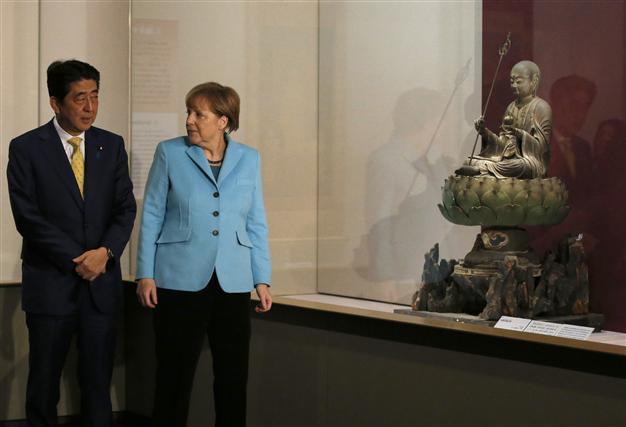Merkel says honesty, generosity key in postwar reconciliation
TOKYO - Agence France-Presse

Germany's Chancellor Angela Merkel, right, talks with Japanese Prime Minister Shinzo Abe, in front of a bodhisattva statue displayed at the Nezu Museum in Tokyo Monday, March 9, 2015. AP Photo
German Chancellor Angela Merkel waded into the fraught area of wartime forgiveness during a visit to Japan on Monday, saying that "facing history squarely" and "generous gestures" are necessary to mend ties.Merkel was speaking in Tokyo ahead of the 70th anniversary of Japan's defeat in World War II, in which Prime Minister Shinzo Abe's conservative views on Tokyo's war crimes are under scrutiny, and as China and South Korea continue to call for ever more contrition.
"Germany was lucky to be accepted in the community of nations after the horrible experience that the world had to meet with Germany during the period of National Socialism (Nazism) and the Holocaust," she said.
"This was possible first because Germany did face its past squarely, but also because the Allied Powers who controlled Germany after the Second World War would attach great importance to Germany coming to grips with its past."
"One of the great achievements of the time certainly was reconciliation between Germany and France... The French have given just as valuable a contribution as the Germans have," she said.
Relations between Japan and its wartime victims, China and South Korea, are at a low point, with Beijing and Seoul both demanding Tokyo does more to atone for its past.
Nationalists in Japan say Tokyo has apologised enough, and that the constant references to WWII are covering flak for governments in China and South Korea who are seeking to direct popular anger elsewhere.
There were "great minds and great personalities who said we ought to adopt a policy of rapprochement... and without these generous gestures by our neighbours this would not have been possible," Merkel told her audience.
The public lecture came on the first day of a two-day trip to Tokyo, her first in seven years. Abe visited Germany last year.
China's foreign minister Wang Yi on Sunday said Abe would be welcome at Beijing's commemorations of the end of WWII if he is "sincere" about history.
Beijing has not given a specific date for the parade, but it regards September 3, the day after Japan signed its formal surrender to Allied forces on board the USS Missouri in Tokyo Bay, as victory day.
"It's difficult for me as the German chancellor to give you advice on how to deal with part of your neighbourhood," Merkel said in response to questions.
"But I think history and experience tells us also that peaceful means of reconciliation have to be found," she said.
Merkel's visit to Japan is part of her swing through G7 member nations before Germany hosts the group's next summit in June. She has already visited the other five nations.
The visit, her third to Japan in almost 10 years in office, is seen as a balancing act between Germany's ties with Beijing and Tokyo. She has been to China seven times during the same period.
Thanking Japan for joining Western powers in imposing sanctions on Russia over its annexation of Ukraine, Merkel said: "Japan and Germany share common interests whenever the strengthening of the international rule of law is to be brought about."
Issues "such as the sea and trade routes in the East and South China Sea", where safety is seen threatened by territorial rows between China and its neighbours, "will also link Europe with your part of the world," she said.
















